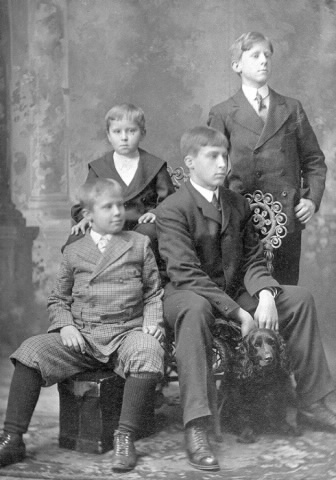
Lieutenant Arthur Cedric McLean
Individual attestation record images are not available for this person.
PERSONAL INFORMATION
MILITARY INFORMATION
- Lance Corporal (Army).
- Lieutenant, 3rd Battalion Canadian Engineers, Canadian Engineers (Army).
- Lieutenant (Army).
- Private (Army).
Images
RESEARCH INFORMATION
Lieutenant Arthur Cedric McLean enlisted in August 1915 and served with the Canadian Engineers for four years in Canada, England, France and Belgium. He was seriously ill with influenza in the fall of 1918 but he recovered and returned to Canada in February 1919 with a war bride.
Arthur Cedric was born on 15 April 1892 in Toronto, Ontario, the son of Archibald Duncan McLean and his wife Alice Louisa. Archibald and Alice (née Meredith) were both born in Ontario, called Canada West at the time, and they were married in 1889 in Toronto. Cedric was the second of their five sons: Duart Meredith (1891, died as a child), Arthur Cedric (1892), Athol Archibald (1894), Basil Meredith (1896) and Ronald Griffin (1899). While the boys were growing up the family lived in Toronto, Sarnia and London, Ontario. Their father had a long career with the Bank of Commerce, starting as a clerk then becoming an accountant and manager. At the time of the 1911 census, when he was 19, Cedric was living at home in Sarnia with his parents and brothers, and working as a clerk at the Bank of Commerce. By the time he enlisted he was a university student and his parents had moved from Sarnia to London.
The war started in August 1914 and Cedric signed up on 31 August 1915 at Rockcliffe Camp, which was located a few km north of Ottawa. He joined the Engineers Training Depot and spent almost seven months training in Canada. He was promoted to Lance Corporal then commissioned as a Lieutenant, signing his Officer’s Declaration on 16 January 1916 in Ottawa and leaving for England in March. He was attached to the Canadian Engineers Training Depot in Shorncliffe, Kent but he suffered from health problems and he spent most of June, July and August in a hospital in Millbank, London. When his health improved he had three more months of training before being attached to the 8th Field Company, Canadian Engineers and sent to France in December 1916. The Canadian Corps had been at the Somme Offensive that fall, where they suffered 24,000 casualties in less than three months. From the Somme they were moved north to the area between Lens and Arras and Cedric's unit was based there when he joined them on 7 December. Early in 1917 the Canadians began preparing for their next big assault, the Battle of Vimy Ridge (9-14 April 1917). The 8th Field Company was involved in a wide variety work including excavating, surveying, laying track, working on dugouts and trenches and building various structures. More intensive training began in March and lectures included one on "Mining & Sapping" by Lieutenant McLean. In mid-March the unit moved to a position 10 km west of Vimy and they were there until mid-April. When the Vimy operation ended they moved south to La Targette and much of their time was spent building and repairing roads and railway tracks.
On 5 June 1917 Cedric was given two weeks leave in England but he was there for a month due to another bout of illness. He rejoined his unit in France on 5 July. Early in October the Canadians were ordered to the Ypres Salient in Belgium to take part in the assault on Passchendaele (26 October-10 November 1917). The 8th Field Company arrived at the French-Belgium border on 16 October and five days later they were in Ypres. Following the Passchendaele operation they remained in Ypres until 18 November when they moved back into France, and at the end of the month Cedric was given another two weeks leave in England. He rejoined his unit on 15 December but a month later, on 14 January 1918, he returned to England and was transferred to the Engineer's Pool. In March 1918 he was back in France and attached to a new unit, the 3rd Battalion, Canadian Engineers. After several months at the Canadian Corps Reinforcement Camp he joined the 3rd Battalion in the field near Arras on 23 July. The final period of the war, known now as the Hundred Days Offensive, began two weeks later with the Battle of Amiens and ended with the Armistice on 11 November 1918. During that time the fighting moved away from trench warfare into a more open phase and towards the end of October the 3rd Battalion was north of Cambrai. On 29 October Cedric was given two weeks leave in England. Shortly after arriving he became seriously ill with influenza and he was admitted to a hospital in Wandsworth, London on 1 November. He was a patient there when the Armistice was signed ten days later and he spent another five weeks recuperating in the hospital and in an officers convalescent centre.
On 3 January 1919 Cedric married Kathleen Ellen Maude Philpott at the register office in the district of Lambeth, London. His address at the time was the Canadian Engineers Training Centre in Seaford. A month later, on 8 February, they left for Canada on the same ship, the Metagama, Cedric with his unit and Kathleen as a housewife going to her in-laws in London, Ontario. Cedric served in Ottawa and London for another seven months and he was allowed to resign in September 1919. He died at Sunnybrook Hospital in Toronto on 10 June 1970, at age 78, and he’s buried in the veteran’s section of York Cemetery.
From The Globe and Mail, June 12, 1970, p.55: Suddenly at Sunnybrook Hospital, Toronto, on June 10, 1970, Arthur Cedric McLean, beloved husband of the late Iva. Son of the late Archibald and Alice McLean, and brother of B. McLean and Ronald G. McLean. R.S. Kane Funeral Home (Yonge at Shepperd). Interment Veterans Section York Cemetery.
All three of his brothers served during the war. Athol Archibald enlisted in September 1914 and he was commissioned as a Second Lieutenant in the British Army. He was one of 19,000 British soldiers and officers who died on 1 July 1916, the first day of the Battle of the Somme. Basil Meredith, a chemist, was called up in October 1918, a month before the Armistice, and he served in Canada with the 1st Central Ontario Regiment. Ronald Griffin enlisted in Ottawa in May 1918, at age 19, and he served in England with the 1st Canadian Tank Battalion.
Their father Archibald passed away in March 1923, at age 63, and he's buried in the Mausoleum at Woodland Cemetery in London, Ontario.
Photo of McLean brothers courtesy of Toronto Public Library: McLean brothers
------------------------
Cedric's 2xgreat-grandfather was Hon. Colonel Neil McLean of Mingary, Scotland, an officer in the 84th Regiment (Royal Highland Emigrants). He immigrated to Quebec and served with his regiment during the American Revolution and the War of 1812. He also held positions as sheriff, militia colonel, justice of the peace and judge. Colonel McLean married Isabella MacDonell in 1784. They lived in St. Andrew’s, Upper Canada and they had eight children.
Cedric’s great-grandfather Archibald McLean was born in April 1791 in St. Andrew’s. He fought in the War of 1812 with the 3rd Regiment of York and was severely wounded at the Battle of Queenston Heights. After recuperating he fought at the Battle of Lundy’s Lane. He was captured by the Americans and spent the rest of the war as a prisoner. Archibald became a lawyer and judge and served as Chief Justice and Speaker of the House. He was married to Joan McPherson of Trois-Rivières, Quebec.
------------------------
Researched by B. Johnson (bjwpg at yahoo dot ca).
Previous experience was with the McGill University Regiment.
[Private Army Canadian Engineers Canadian Engineers Lance Corporal Army Canadian Engineers Canadian Engineers Lieutenant Army Canadian Engineers 8th Field Company Lieutenant Army Canadian Engineers 3rd Battalion ]
